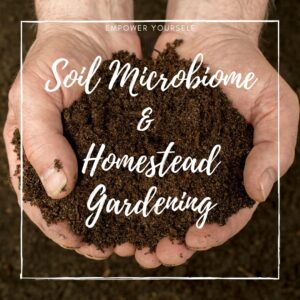The Truth Lies Within the Soil
Introduction to the Soil Microbiome and Homestead Gardening Course
Welcome to the Soil Microbiome and Homestead Gardening Course, offered by Living Ground. My name is Leisha, a Certified Soil Food Web Consultant (CTP graduate) from Dr. Elaine Ingham’s Soil Food Web Consultancy Program. Living Ground is proud to be a Project Site for Self-Reliance, dedicated to empowering students through online courses that promote self-reliance and sustainable practices.
Over the past five years, my journey of becoming a Microbe Gardener has been transformative. Gardening in harmony with nature has brought me back to one fundamental element: soil. Whether you aim to grow your own food, vegetables, herbs or medicines or raise livestock, the soil is the cornerstone of productivity and nutrient density. The good food movement has taught us the importance of “feeding the soil, not the crop,” but the methods we often use still borrow from an agricultural system that isn’t entirely effective. This results in an incomplete understanding of soil’s true needs.
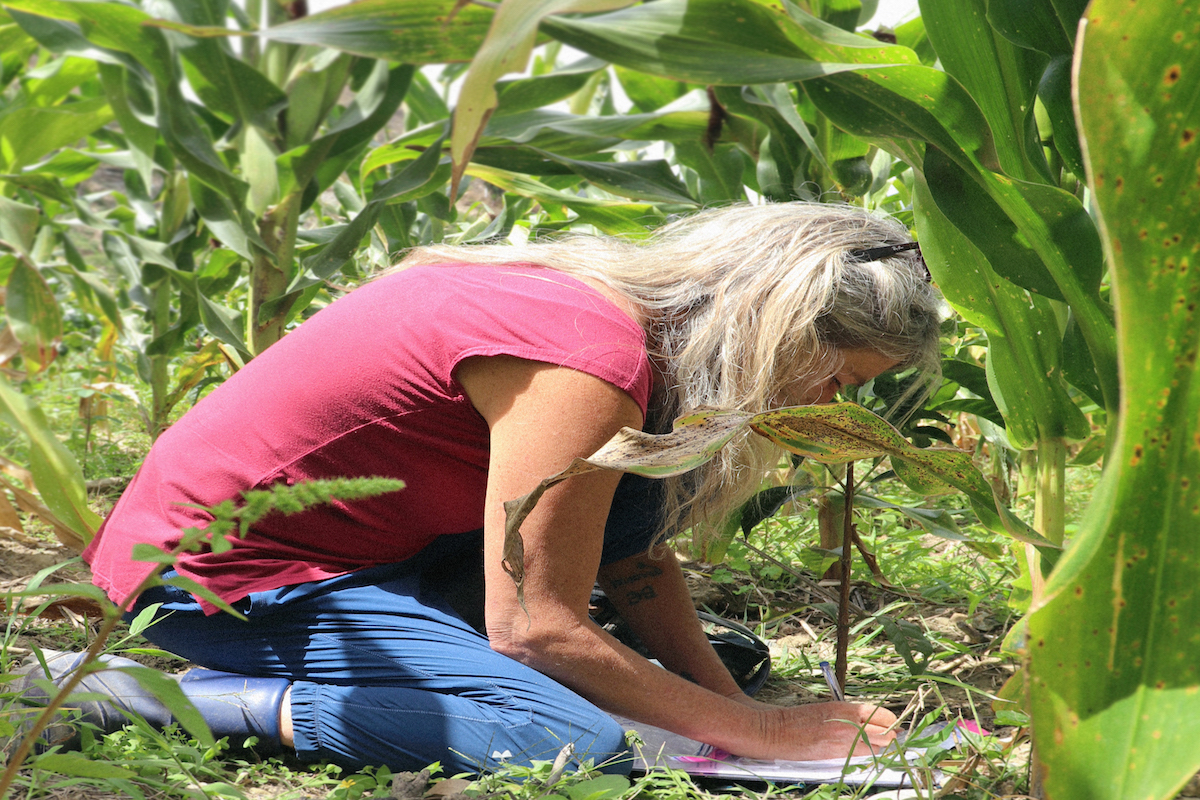
In this course, we will go beyond the typical focus on macronutrients and explore the vital roles of micronutrients, trace minerals, and, most importantly, the soil microbiome. Analogous to a well-balanced diet necessary for a child’s health, our soil requires a variety of nutrients and microorganisms to thrive. Unfortunately, practices like using harmful chemicals or mechanical disturbances can deplete these essential microbes, despite nutrient additions.

The starting point is understanding the life within your soil. Drawing from my studies and hands-on experience using Dr. Ingham’s methods, I can attune you to the importance of soil microscopic life. Examining soil samples through a microscope shifted my approach to soil management dramatically. With an organized toolbox of sustainable techniques, I now make informed decisions about mulching, tilling, cover cropping, and more, all aimed at fostering diverse soil life.
Healthy soil teems with a dynamic food web of bacteria, protozoa, fungi, and nematodes, each playing a unique role. They suppress diseases, make nutrients available, and improve soil structure and water retention. This course will teach you how to identify these crucial organisms, understand their roles, and manage your soil to encourage balanced microbial communities. Additionally, I will guide you through the process of making Microbe Compost—an essential practice for cultivating a thriving soil microbiome.
We will delve into practical and effective soil management practices, such as selecting appropriate mulches, reducing soil tillage, using cover crops, homemade composting, and creating compost teas. Understanding the life in your soil will utterly transform why and how you implement these practices, empowering you with the knowledge to rejuvenate your garden or homestead.
Traditional soil assessments often miss the mark by focusing solely on macronutrients and conventional methods. Through this course, we aim to fill that gap, offering qualitative biological soil assessments. With comprehensive instruction and hands-on experiences, you’ll gain insights into your soil that could change everything.
Join us in this comprehensive course to learn all I have been taught and have experienced in my journey as a Microbe Gardener. Through understanding the soil’s microbiome and mastering the art of Microbe Composting, you’ll be well-equipped to foster healthier soils and more productive gardens, sustainably and naturally.
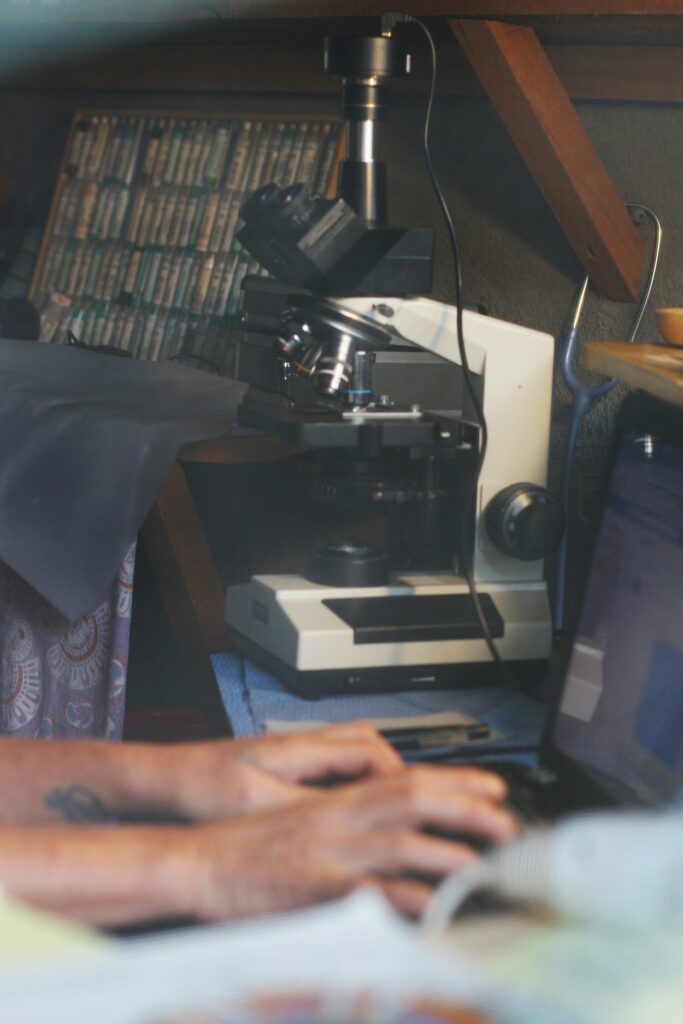
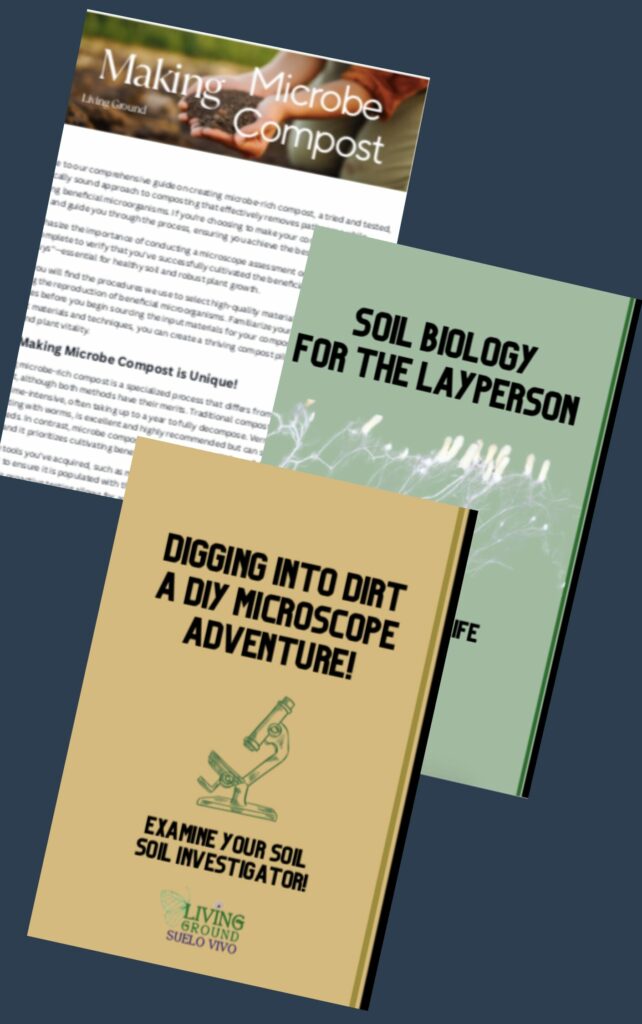
Details and Informative Ebooks to guide you journey
Course Manual
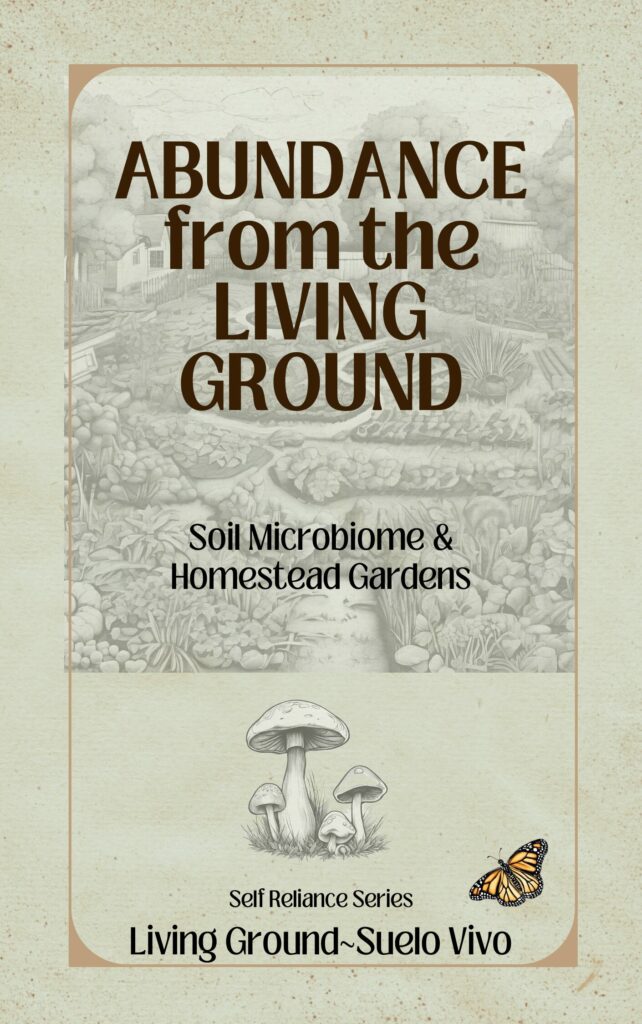
.
This Course takes you on an immersive journey into the fascinating world beneath our feet. Just as live blood analysis unveils the intricate dynamics of our vital fluids, this course explores the intricate web of life teeming within the soil.
Soil is a complex biological marvel, hosting a vast array of microscopic organisms that play a crucial role in sustaining life on our planet. While we may be familiar with the visible components of soil, such as minerals and organic matter, the true magic lies in the invisible realm of microorganisms. You will learn how to use a simple microscope to determine the health of your own soil, unlocking a world of insights into the vibrant communities that support plant growth.
These tiny beings form intricate communities, communicating through an intricate network of chemical signals, facilitating nutrient cycling, and supporting the growth of plants. By delving into the study of soil microbiomes, we gain a deeper understanding of the intricate relationships that govern the health and fertility of our gardens and ecosystems.
Throughout history, civilizations have recognized the importance of healthy soil for sustaining agriculture and promoting environmental balance. In this course, you will learn how to grow a homestead garden, large or small, to create amazing nutritious food, harnessing the power of the soil microbiome to cultivate abundance and resilience.
From the intricate dance of bacteria and fungi to the dynamic interactions of nematodes and protozoa, this course offers a unique window into the vibrant world beneath our feet. By observing and cultivating these living communities, we can gain invaluable insights into nurturing thriving gardens, promoting sustainable agriculture, and fostering a harmonious relationship with the natural world.
Get ready to embark on a journey of discovery, where the secrets of the soil microbiome will be unveiled, empowering you to cultivate abundance, resilience, and a deeper connection with the earth.
Building upon the foundation of understanding the soil microbiome, the path to self-sufficiency through gardening can seem daunting for those just starting out, and even for experienced homesteaders seeking to refine their practices. This course is designed to guide both beginners and seasoned practitioners on their journey toward self-reliance.
For those new to the world of self-sufficient gardening, the prospect of growing one’s own food, medicines, and nurturing a thriving ecosystem can be overwhelming. Where do you begin? How do you cultivate a healthy soil microbiome? What are the best practices for ensuring a bountiful harvest? These are the questions that often hinder those taking their first steps toward self-reliance.
This course provides a comprehensive roadmap, starting with the foundational principles of microbe gardening. By understanding the intricate web of life within the soil, you’ll gain the knowledge and skills to create a fertile canvas upon which to cultivate abundance.
However, self-sufficiency extends beyond just the soil. It’s an art form that encompasses the entire cycle of cultivation, from seed selection and planting techniques to harvesting, preserving, and utilizing the fruits of your labor. Whether you’re seeking to grow nutrient-dense food, medicinal herbs, or a diverse array of crops, this course will equip you with the practical knowledge and time-tested wisdom to thrive.
For those already on the path of self-reliance, this course offers an opportunity to deepen your understanding and refine your practices. Perhaps you’ve encountered challenges or imbalances in your garden ecosystem, or you’re seeking to expand your repertoire of self-sufficient skills. Here, you’ll find a wealth of insights and strategies to troubleshoot issues, optimize your systems, and continually evolve your approach.
Regardless of your starting point, this course is a comprehensive guide to self-sufficient gardening, rooted in the principles of microbe gardening and a deep reverence for the natural world. It’s a journey that empowers you to reclaim your connection to the land, nurture your self-reliance, and cultivate a harmonious relationship with the intricate systems that sustain life itself.
What is the difference between organic gardening and microbe gardening?
While both organic and microbe gardening share the goal of cultivating healthy plants without synthetic chemicals, there is a fundamental difference in their underlying philosophies and approaches.
Organic gardening, although using natural inputs like compost and manure, still relies on adding external fertilizers and employing antimicrobial methods to remove pests and pathogens. While these inputs are derived from natural sources, they essentially force plant growth and attempt to control the garden ecosystem through external interventions.
Microbe gardening, on the other hand, operates from the principle that a balanced and thriving soil microbiome is the key to ensuring optimal plant health and nutrient uptake. Rather than relying on external inputs to force growth, microbe gardening focuses on cultivating the intricate web of life within the soil itself.
Unlike organic gardening, which may use natural fertilizers that can overstimulate plant growth akin to a bodybuilder on steroids, microbe gardening aims to nurture the soil’s inherent ability to provide plants with the necessary nutrients through the symbiotic relationships between microbes and plant roots.
By magnifying the soil’s microscopic world, microbe gardeners can observe the health and functionality of these vital microbial communities, identify imbalances, and address the root causes of plant health issues through fostering a balanced soil ecosystem.
The purpose of microbe gardening is to create a self-sustaining, resilient, and abundant garden by harnessing the power of the soil microbiome, rather than attempting to control or force the system through external inputs. It is a holistic approach that recognizes the intricate interconnectedness of all life within the soil, and seeks to work in harmony with these natural processes.
While professional-grade microscopes can be used can cost between $3,000 and $10,000, such an investment is unnecessary for this course. Instead, a suitably equipped microscope within the $200 to $1,000 range will suffice.To participate in this course and effectively learn how to view yoursoil or compost, you will need the following equipment:
A Basic Microscope
4x, 10x, 40x, and 100x magnification,
binocular or trinocular head, and LED illumination.
Prices vary based on brand and features.
Microscope Slides: $10 – $20
Pack of 72 glass microscope slides.
Microscope Cover Slips: $5 – $15
Pack of 100 to 200 glass coverslips.
Lens Tissue Cleansing Paper or Glass cleaning cloth: $5 – $10
Pack of lens tissue or cleansing paper.
A tube for sample making with “ml” measurements and an eye-dropper $5 – $10
Total Approximate Cost: $200 to $800
Please note that these are rough estimates and actual prices may vary depending on brand, quantity, and retailer.
Microscope Specifications
Key Features to Look For:
Magnification Power:
A microscope with at least four magnification levels: 4x, 10x, 40x, and 100x.
Binocular or Trinocular Head:
Binocular head (two eyepieces) for direct viewing.
Trinocular head includes a phototube for camera attachment (useful for displaying images on a screen but not compulsory).
Illumination:
Built-in illumination system (LED or halogen light source) for adequate brightness.
Advanced features like phase contrast, darkfield, or fluorescence are helpful but not essential.
Reputable brands like Amscope, OMAX, or Swift offer affordable and reliable microscopes specifically designed for live blood analysis, often including accessories like slides and cover slips.
Choosing a Microscope: Key Features and Specifications
Some examples from Amazon https://www.amazon.com/Microscopes/b?node=499170 (no affliliation)
Soil Microbiome and Homestead Gardening
The soilution is beneath our feet Who would like to examine their own soil under the microscope?” This simple question often elicits hesitation and reluctance from those unfamiliar with microbe gardening. There is a fear of what their soil might reveal – “What if the microbes show that despite our best efforts to cultivate a…

